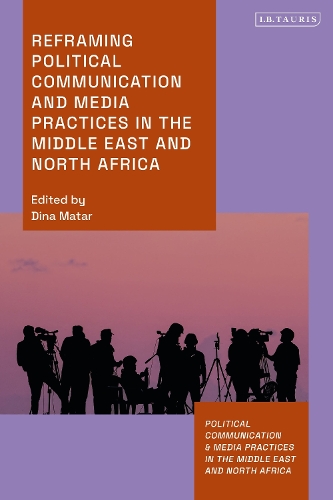
Reframing Political Communication and Media Practices in the Middle East and North Africa
(Hardback)
Publishing Details
Reframing Political Communication and Media Practices in the Middle East and North Africa
By (Author) Dina Matar
Bloomsbury Publishing PLC
I.B. Tauris
26th June 2025
United Kingdom
Classifications
Tertiary Education
Non Fiction
320.956014
Physical Properties
Hardback
248
Width 164mm, Height 236mm, Spine 20mm
520g
Description
A decade on from the Arab uprisings, debates continue to reiterate exceptionalist discourses about the region and its peoples which tend to deny individual agency. They also neglect long collective histories of mediated political cultures that have emerged within colonial and post-colonial structures and outside peripheries of formal power and politics. This book problematizes the relationship between politics and communication in the Middle East and North Africa region, paying attention to the diversity of communicative forms and political practices outside formal institutions and structures while remaining conscious of the power dynamics within institutional practices. Examining political communication in Palestine, Lebanon, Egypt, Morocco, Iraq, Syria, Turkey,Tunisa and Iran, the books chapters challenge Western-centric theories and methodologies that dominate the broad field of political communication by reframing the discussions to include the politics of the marginal or the peripheral, the informal, and the grassroots.
Reviews
Dina Matar has assembled an outstanding array of scholars whose chapters in this volume reflect and respect the diversity of political communication in the greater MENA region. The authors thoughtfully examine the regions distinctively non-Western media environments, making the book a valuable addition to the literature of evolving media practices. * Philip Seib, Professor Emeritus of Journalism and Public Diplomacy, University of Southern California, author of The Al Jazeera Effect. *
There could hardly be a more important time for this collection to be published and its relevance will be felt for many years to come. This book not only reframes but also recasts what political communication means through the lens of the Middle East and North Africa region. With a clear emancipatory purpose, authors deftly take to task the field of political communication's for its "hierarchical, classist, capitalist, heteropatriarchal, elitist, imperialist, and westernized status quo". Stressing the importance of social and cultural history, the imperative of understanding war as political communications, and the necessity for scholarship to upend colonialism and its legacies, the book challenges and confronts complacency and complicity in our field and shows how it can be done otherwise. Crucial reading for everyone in the field of political communications and beyond. * Natalie Fenton, Professor of Media and Communications, Goldsmiths, University of London, UK *
This collection is an essential guide to complex media landscapes across the Middle East and North Africa. The book contains deeply critical and historically contextualized accounts of diverse forms of political communications written by leading scholars. Its nine chapters focus on everything from precarious storytelling in Palestine to hate speech in Lebanon, and from new forms of activist journalism in Iraq to conflicting public spheres in Tunisia. It is required reading for anyone who sees media and culture both as instruments of state control and potential sites of resistance to imperialism and colonialism. * Des Freedman, Professor of Media and Communications, Goldsmiths, University of London, UK *
Author Bio
Dina Matar is a Professor at the School of Oriental and African Studies (SOAS), University of London, UK. She is the Chair of the SOAS Centre of Palestine Studies and the Centre for Global Media and Communication. She is Series Editor of the series Political Communication and Media Practices in the Middle East and North Africa, and SOAS Palestine Studies.
